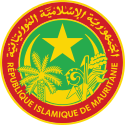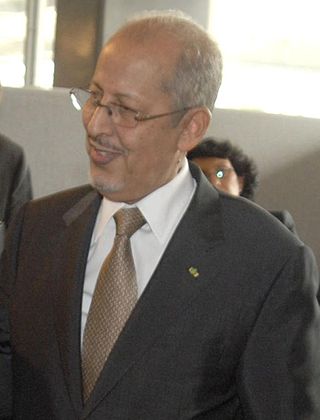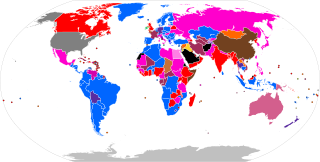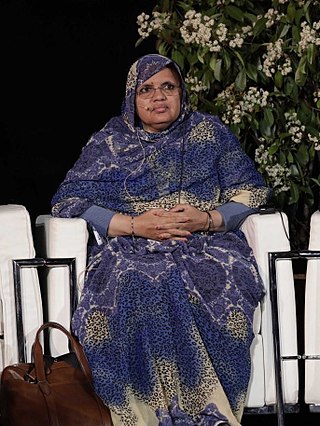| Party | National PR seats | Women's seats | Constituency seats | Total
seats |
|---|
| First round | Second round |
|---|
| Votes | % | Seats | Votes | % | Seats | Votes | % | Seats | Votes | % | Seats |
|---|
| Union for the Republic | 136,809 | 19.47 | | 135,831 | 19.60 | | | | | | | | 93 |
| Tewassoul | 79,283 | 11.28 | | 87,473 | 12.62 | | | | | | | | 14 |
| Union for Democracy and Progress | 30,495 | 4.34 | | 32,625 | 4.71 | | | | | | | | 6 |
| El Karam | 24,761 | 3.52 | | 24,131 | 3.48 | | | | | | | | 6 |
| National Democratic Alliance | 22,148 | 3.15 | | 20,257 | 2.92 | | | | | | | | 4 |
| Union of the Forces of Progress | 19,664 | 2.80 | | 23,275 | 3.36 | | | | | | | | 3 |
| Rally of Democratic Forces | 19,273 | 2.74 | | 18,335 | 2.65 | | | | | | | | 3 |
| Shura Party for Development | 15,409 | 2.19 | | 9,941 | 1.43 | | | | | | | | 3 |
| Unitary Party for the Construction of Mauritania | 14,063 | 2.00 | | 15,802 | 2.28 | | | | | | | | 4 |
| People's Progressive Alliance | 12,899 | 1.84 | | 13,045 | 1.88 | | | | | | | | 3 |
| Sawab | 12,265 | 1.75 | | 9,880 | 1.43 | | | | | | | | 3 |
| Burst of Youth for the Nation | 11,273 | 1.60 | | 12,299 | 1.77 | | | | | | | | 3 |
| National Pact for Democracy and Development | 9,865 | 1.40 | | 12,228 | 1.76 | | | | | | | | 2 |
| El Wiam | 9,188 | 1.31 | | 8,499 | 1.23 | | | | | | | | 2 |
| Party for Conciliation and Prosperity | 7,878 | 1.12 | | 5,210 | 0.75 | | | | | | | | 1 |
| AJD/MR | 7,102 | 1.01 | | 5,895 | 0.85 | | | | | | | | 1 |
| Party of Unity and Development | 6,890 | 0.98 | | 3,877 | 0.56 | | | | | | | | 0 |
| Ravah Party | 6,749 | 0.96 | | 8,562 | 1.24 | | | | | | | | 0 |
| Mauritanian Party for the Union and Reform | 6,521 | 0.93 | | 4,178 | 0.60 | | | | | | | | 0 |
| El Vadila | 6,265 | 0.89 | | 5,658 | 0.82 | | | | | | | | 0 |
| Party of Mauritanian Authenticity | 6,256 | 0.89 | | 7,874 | 1.14 | | | | | | | | 0 |
| Mauritanian Party for Justice and Democracy | 5,994 | 0.85 | | 3,772 | 0.54 | | | | | | | | 0 |
| National Democratic Union | 5,655 | 0.80 | | 9,182 | 1.32 | | | | | | | | 1 |
| El Moustaghbel | 5,570 | 0.79 | | 8,472 | 1.22 | | | | | | | | 0 |
| Republican Party for Democracy and Renewal | 5,533 | 0.79 | | 8,315 | 1.20 | | | | | | | | 0 |
| El Islah | 5,334 | 0.76 | | 9,008 | 1.30 | | | | | | | | 1 |
| Rally for Mauritania | 4,855 | 0.69 | | 3,243 | 0.47 | | | | | | | | 0 |
| Avant-Garde Party of the Forces of Democratic Reform | 4,717 | 0.67 | | 4,443 | 0.64 | | | | | | | | 1 |
| Movement for Refoundation | 4,709 | 0.67 | | 4,032 | 0.58 | | | | | | | | 0 |
| Mauritanian Liberal Democratic Party | 4,607 | 0.66 | | 4,342 | 0.63 | | | | | | | | 0 |
| National Union for Democracy and Development | 4,538 | 0.65 | | – | – | – | | | | | | | 0 |
| Rally for Freedom and Democracy | 4,338 | 0.62 | | 4,479 | 0.65 | | | | | | | | 0 |
| Mauritanian Party for Tomorrow | 4,196 | 0.60 | | 5,156 | 0.74 | | | | | | | | 1 |
| Mauritanian People's Congress | 4,063 | 0.58 | | 2,889 | 0.42 | | | | | | | | 0 |
| WAVA Mauritanian Party | 4,006 | 0.57 | | 2,915 | 0.42 | | | | | | | | 0 |
| Social Democrat Union | 3,915 | 0.56 | | – | – | – | | | | | | | 0 |
| Party of Conservatives | 3,850 | 0.55 | | 2,003 | 0.29 | | | | | | | | 0 |
| Party of the Mauritanian Masses | 3,771 | 0.54 | | 4,907 | 0.71 | | | | | | | | 0 |
| Current Party of Renewing Thought | 3,706 | 0.53 | | 3,198 | 0.46 | | | | | | | | 0 |
| Coalition of Mauritainians for the Fatherland | 3,675 | 0.52 | | – | – | – | | | | | | | 1 |
| Dignity and Action Party | 3,520 | 0.50 | | 3,177 | 0.46 | | | | | | | | 0 |
| Party of Labour and Equality | 3,448 | 0.49 | | 3,058 | 0.44 | | | | | | | | 0 |
| Democratic Justice Party | 3,441 | 0.49 | | 3,358 | 0.48 | | | | | | | | 0 |
| Democratic Alliance Party | 3,431 | 0.49 | | 5,237 | 0.76 | | | | | | | | 0 |
| Party of Peace and Democratic Progress | 3,392 | 0.48 | | 4,515 | 0.65 | | | | | | | | 1 |
| Mauritanian Party of Renewal | 3,384 | 0.48 | | 4,316 | 0.62 | | | | | | | | 0 |
| Democratic Renewal | 3,370 | 0.48 | | 3,622 | 0.52 | | | | | | | | 0 |
| Nida El Watan | 3,366 | 0.48 | | 2,907 | 0.42 | | | | | | | | 0 |
| Democratic Socialist Party | 3,359 | 0.48 | | 6,015 | 0.87 | | | | | | | | 0 |
| National Agreement Party | 3,270 | 0.47 | | – | – | – | | | | | | | 0 |
| Direct Democracy Movement | 3,230 | 0.46 | | 4,270 | 0.62 | | | | | | | | 0 |
| Popular Front | 3,201 | 0.46 | | 3,218 | 0.46 | | | | | | | | 0 |
| Mauritanian Party for Justice and Development | 3,102 | 0.44 | | 3,608 | 0.52 | | | | | | | | 0 |
| Mauritanian Congress Party | 3,066 | 0.44 | | 2,184 | 0.32 | | | | | | | | 0 |
| National Democratic Convergence | 3,056 | 0.43 | | 2,658 | 0.38 | | | | | | | | 0 |
| New Generation Party | 2,942 | 0.42 | | 3,126 | 0.45 | | | | | | | | 0 |
| Rally for Unity | 2,803 | 0.40 | | 3,974 | 0.57 | | | | | | | | 0 |
| Dialogue and Democracy Party | 2,715 | 0.39 | | 2,555 | 0.37 | | | | | | | | 0 |
| Democratic Khiyar Party | 2,677 | 0.38 | | 3,778 | 0.55 | | | | | | | | 0 |
| Third Generation Party | 2,671 | 0.38 | | 2,994 | 0.43 | | | | | | | | 0 |
| National Ribat Party for Rights and Generation Construction | 2,610 | 0.37 | | 1,816 | 0.26 | | | | | | | | 0 |
| Mauritanian Party for Renewal and Harmony | 2,491 | 0.35 | | 4,039 | 0.58 | | | | | | | | 0 |
| Justice and Equality Party | 2,385 | 0.34 | | 2,354 | 0.34 | | | | | | | | 0 |
| Democratic Consultation Party | 2,380 | 0.34 | | 2,826 | 0.41 | | | | | | | | 0 |
| Union for the Construction of Mauritania | 2,340 | 0.33 | | 1,250 | 0.18 | | | | | | | | 0 |
| Socialist Democratic Unionist Party | 2,198 | 0.31 | | 2,046 | 0.30 | | | | | | | | 0 |
| Mauritanian Party for the Defence of the Environment | 2,169 | 0.31 | | 1,344 | 0.19 | | | | | | | | 0 |
| National Development Party | 2,166 | 0.31 | | 1,698 | 0.24 | | | | | | | | 0 |
| Movement of Mauritanian Patriots | 2,092 | 0.30 | | 1,991 | 0.29 | | | | | | | | 0 |
| Parti Ribat Démocratique et Social | 2,036 | 0.29 | | 2,290 | 0.33 | | | | | | | | 0 |
| New Vision | 2,034 | 0.29 | | 3,103 | 0.45 | | | | | | | | 0 |
| Democratic People's Party | 2,024 | 0.29 | | 1,639 | 0.24 | | | | | | | | 0 |
| Party of Generations of the Democratic Future | 2,004 | 0.29 | | – | – | – | | | | | | | 0 |
| Union for Justice and Development | 1,943 | 0.28 | | – | – | – | | | | | | | 0 |
| Democratic Union of Youth | 1,926 | 0.27 | | 1,105 | 0.16 | | | | | | | | 0 |
| People's Rally Party | 1,845 | 0.26 | | 1,450 | 0.21 | | | | | | | | 0 |
| Republican Front for Unity and Democracy | 1,829 | 0.26 | | – | – | – | | | | | | | 0 |
| Mauritanian Hope Party | 1,824 | 0.26 | | 2,709 | 0.39 | | | | | | | | 0 |
| Rally for Democracy and Unity | 1,819 | 0.26 | | 1,710 | 0.25 | | | | | | | | 0 |
| Parti du Concret, Arc en ciel | 1,808 | 0.26 | | 1,249 | 0.18 | | | | | | | | 0 |
| Party for Equity and the Defence of Rights | 1,664 | 0.24 | | – | – | – | | | | | | | 0 |
| Parti de la Mauritanie Comptemporaine | 1,658 | 0.24 | | – | – | – | | | | | | | 0 |
| El Inma National Party | 1,630 | 0.23 | | 1,502 | 0.22 | | | | | | | | 0 |
| People's Democratic Party | 1,621 | 0.23 | | 1,433 | 0.21 | | | | | | | | 0 |
| Union for Planning and Construction | 1,596 | 0.23 | | – | – | – | | | | | | | 0 |
| Union for Development and Democracy | 1,523 | 0.22 | | 1,352 | 0.20 | | | | | | | | 0 |
| Union of the Democratic Center | 1,487 | 0.21 | | 1,031 | 0.15 | | | | | | | | 0 |
| Party of Construction and Progress | 1,407 | 0.20 | | 2,851 | 0.41 | | | | | | | | 0 |
| Mauritanian Party for Renewal and Democracy | 1,269 | 0.18 | | 818 | 0.12 | | | | | | | | 0 |
| Party for Freedom, Equality and Justice | 1,265 | 0.18 | | 1,124 | 0.16 | | | | | | | | 0 |
| Party of Civilisation and Development | 1,249 | 0.18 | | 2,683 | 0.39 | | | | | | | | 0 |
| Rally for Equality and Justice | 1,235 | 0.18 | | 1,360 | 0.20 | | | | | | | | 0 |
| Mauritanian People's Movement | 1,132 | 0.16 | | 1,373 | 0.20 | | | | | | | | 0 |
| Alliance for Democracy in Mauritania | 1,122 | 0.16 | | 1,493 | 0.22 | | | | | | | | 0 |
| National Construction | 1,061 | 0.15 | | 1,199 | 0.17 | | | | | | | | 0 |
| Mauritanian Party for Reform and Equality | 1,049 | 0.15 | | 1,363 | 0.20 | | | | | | | | 0 |
| Mauritanian Union of Social Forces | 1,032 | 0.15 | | 1,099 | 0.16 | | | | | | | | 0 |
| Blank votes | 21,374 | 3.14 | – | 23,521 | 3.39 | – | | | – | | | – | – |
| Invalid votes | 324,659 | – | – | 333,298 | – | – | | – | – | | – | – | – |
| Total | 1,027,367 | 100 | 20 | 1,026,371 | 100 | 20 | | | | | | | 157 |
| Registered voters/turnout | 1,417,823 | 72.46 | – | 1,417,823 | 72.43 | – | | | – | | | – | – |
| Source: CENI, CENI |










